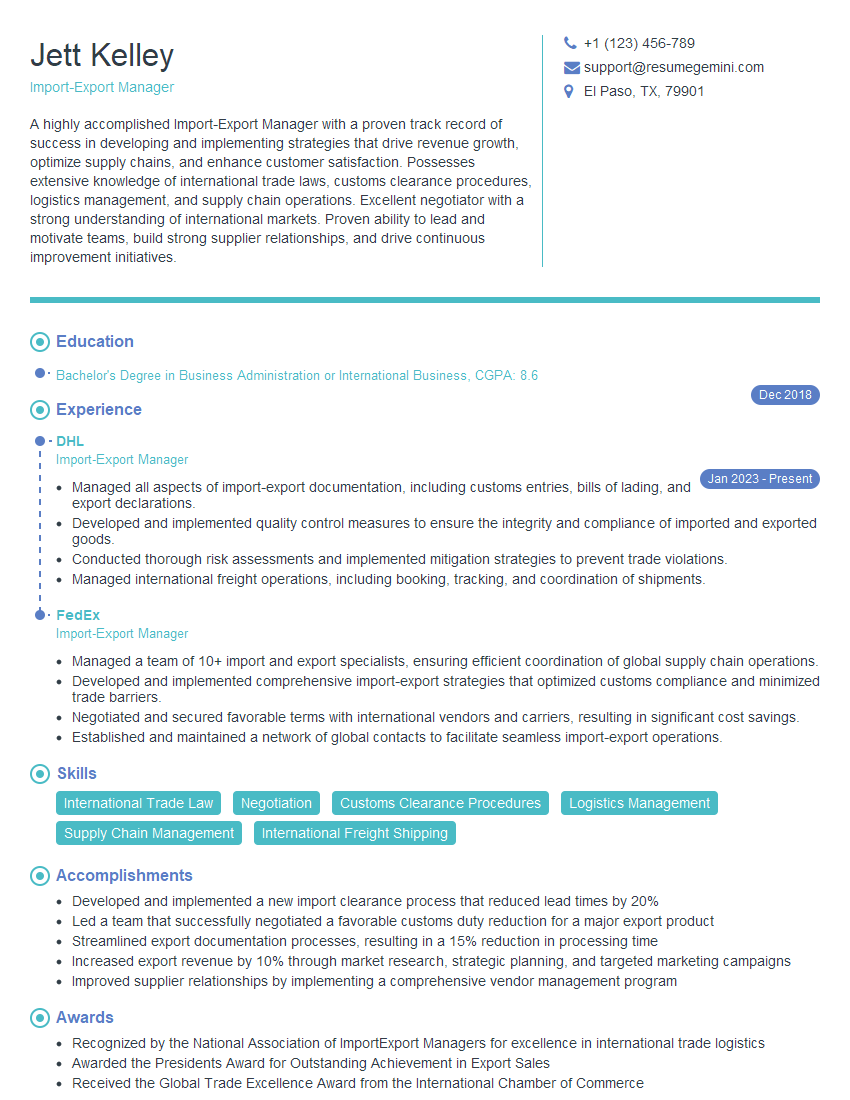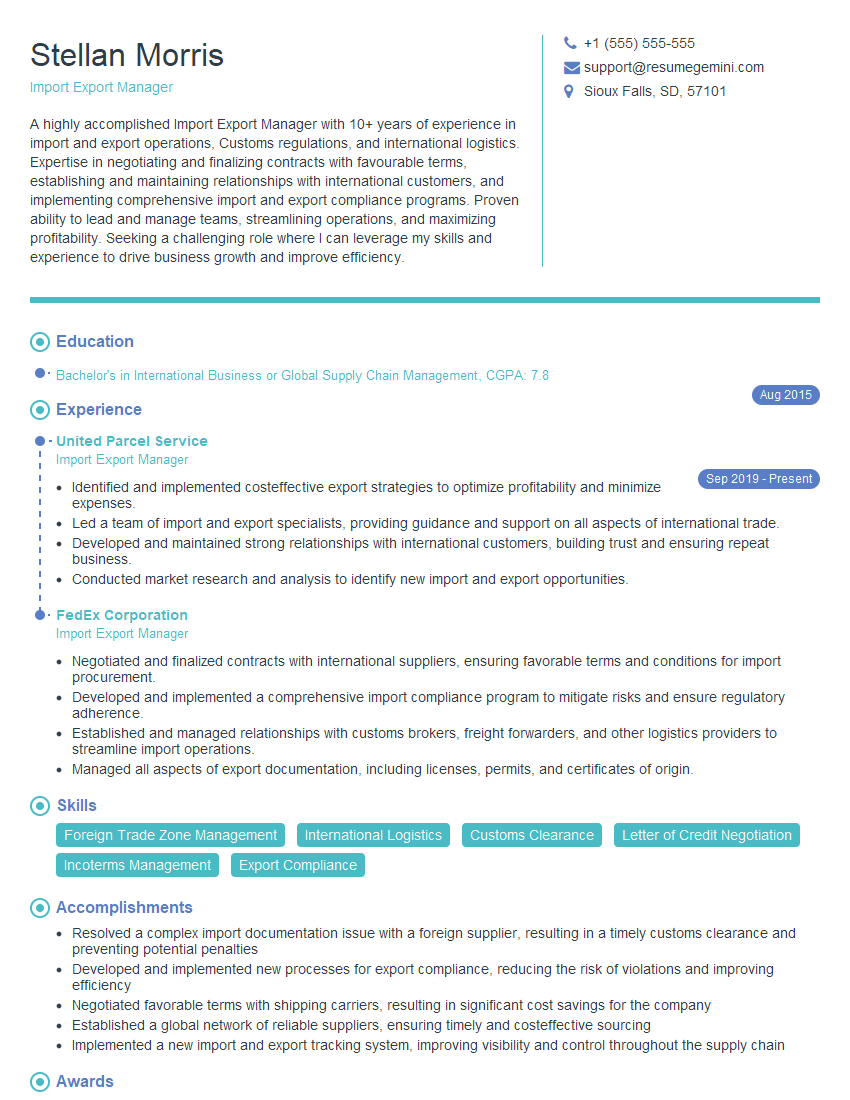Are you gearing up for a career in Import-Export Manager? Feeling nervous about the interview questions that might come your way? Don’t worry, you’re in the right place. In this blog post, we’ll dive deep into the most common interview questions for Import-Export Manager and provide you with expert-backed answers. We’ll also explore the key responsibilities of this role so you can tailor your responses to showcase your perfect fit.
Acing the interview is crucial, but landing one requires a compelling resume that gets you noticed. Crafting a professional document that highlights your skills and experience is the first step toward interview success. ResumeGemini can help you build a standout resume that gets you called in for that dream job.
Essential Interview Questions For Import-Export Manager
1. What are the key responsibilities of an Import-Export Manager?
As an experienced Import-Export Manager, I am fully aware of the diverse responsibilities associated with this role, including:
- Developing and executing comprehensive import-export strategies and plans.
- Identifying, evaluating, and negotiating with international suppliers and customers.
2. How do you stay up-to-date on the latest regulations and compliance requirements related to import-export activities?
Regulatory Monitoring
- Regularly review industry publications, attend conferences, and participate in webinars.
- Maintain close relationships with government agencies and industry associations.
In-house Knowledge Sharing
- Establish internal processes for disseminating regulatory updates to relevant stakeholders.
- Conduct training sessions and workshops to educate staff on compliance requirements.
3. What strategies have you used to optimize import-export operations and reduce costs?
Throughout my career, I have implemented various strategies to enhance efficiency and minimize expenses, including:
- Negotiating favorable terms with carriers and freight forwarders.
- Identifying alternative sourcing options and negotiating competitive pricing with suppliers.
- Optimizing inventory levels through forecasting and demand planning.
- Automating processes and leveraging technology to improve efficiency and reduce errors.
4. How do you manage the complex documentation and paperwork involved in import-export transactions?
Effective document management is crucial. I have developed and implemented a comprehensive system that includes:
- Establishing clear and concise documentation procedures.
- Utilizing document management software to organize and track all documentation.
- Partnering with customs brokers and freight forwarders to ensure accuracy and compliance.
- Regularly reviewing and updating documentation to reflect any changes in regulations or requirements.
5. How do you resolve disputes and conflicts that may arise during import-export transactions?
Dispute resolution is a critical aspect of import-export management. I approach conflicts with a pragmatic and solution-oriented mindset:
- Gather all relevant information and assess the situation thoroughly.
- Communicate openly and effectively with all parties involved.
- Identify and prioritize the underlying interests and concerns.
- Explore creative and mutually acceptable solutions.
- Document all agreements and ensure follow-through to prevent future disputes.
6. How do you ensure the quality of imported goods and avoid potential liability issues?
Product quality is paramount. I employ a multifaceted approach to ensure the integrity of imported goods:
- Establishing clear quality standards and specifications.
- Conducting thorough due diligence on suppliers and their production processes.
- Implementing quality control measures at various stages of the import process.
- Regularly inspecting goods upon arrival and maintaining detailed records.
- Working closely with customs authorities to comply with all import regulations and standards.
7. What is your approach to managing risk in import-export operations?
Risk management is essential to mitigate potential disruptions and financial losses. I adopt a proactive approach that includes:
- Identifying and assessing potential risks throughout the import-export process.
- Developing and implementing risk mitigation strategies, such as diversification of suppliers and transportation routes.
- Maintaining adequate insurance coverage to protect against unforeseen events.
- Regularly monitoring and reviewing risk factors to adapt strategies as needed.
8. How do you stay organized and manage multiple projects simultaneously in a fast-paced import-export environment?
Organization and time management are crucial. I utilize a combination of strategies to maintain efficiency:
- Prioritizing tasks based on urgency and importance.
- Creating and maintaining clear project plans and timelines.
- Leveraging project management tools and software.
- Delegating tasks effectively to team members.
- Maintaining open communication and regular check-ins to ensure alignment.
9. How do you measure and track the success of your import-export operations?
Measuring performance is essential for continuous improvement. I use a combination of metrics, including:
- Sales growth and profitability.
- Customer satisfaction and retention rates.
- Operational efficiency and cost reduction.
- Compliance with regulations and industry standards.
- Regularly reviewing these metrics and making data-driven decisions to optimize operations.
10. What are your key strengths and weaknesses as an Import-Export Manager?
Building on my core competencies in import-export management, I possess the following strengths:
Strengths
- Strong understanding of international trade regulations and compliance requirements.
- Excellent negotiation and communication skills.
- Proven ability to develop and execute import-export strategies.
- Expertise in managing complex documentation and ensuring product quality.
- Ability to work effectively in a fast-paced and demanding environment.
I am also aware of areas where I can continue to grow:
Weaknesses
- Limited experience in managing large-scale import-export operations.
- Need to further develop my knowledge of emerging technologies in the import-export industry.
However, I am committed to continuous learning and professional development to address these areas and enhance my overall effectiveness.
Interviewers often ask about specific skills and experiences. With ResumeGemini‘s customizable templates, you can tailor your resume to showcase the skills most relevant to the position, making a powerful first impression. Also check out Resume Template specially tailored for Import-Export Manager.
Career Expert Tips:
- Ace those interviews! Prepare effectively by reviewing the Top 50 Most Common Interview Questions on ResumeGemini.
- Navigate your job search with confidence! Explore a wide range of Career Tips on ResumeGemini. Learn about common challenges and recommendations to overcome them.
- Craft the perfect resume! Master the Art of Resume Writing with ResumeGemini’s guide. Showcase your unique qualifications and achievements effectively.
- Great Savings With New Year Deals and Discounts! In 2025, boost your job search and build your dream resume with ResumeGemini’s ATS optimized templates.
Researching the company and tailoring your answers is essential. Once you have a clear understanding of the Import-Export Manager‘s requirements, you can use ResumeGemini to adjust your resume to perfectly match the job description.
Key Job Responsibilities
Import-Export Managers are responsible for overseeing the efficient procurement, import, and export of goods and services for their organizations. Here are the key job responsibilities:
1. Procurement Management
• Identifies potential suppliers and negotiates contracts for the purchase of goods and services.
• Manages vendor relationships and ensures compliance with contractual obligations.
• Monitors inventory levels and implements just-in-time (JIT) strategies to optimize stock.
2. Import Operations
• Complies with import regulations and customs procedures to ensure timely and cost-effective clearance of goods.
• Arranges transportation and logistics for imported goods, including freight forwarding and warehousing.
• Manages import documentation, including invoices, packing lists, and certificates of origin.
3. Export Operations
• Identifies potential export markets and develops export strategies.
• Complies with export regulations and customs procedures to facilitate smooth export of goods.
• Arranges transportation and logistics for exported goods, including freight forwarding and warehousing.
4. Customs Compliance
• Stays updated on import and export regulations and ensures compliance with all applicable laws.
• Collaborates with customs authorities to facilitate clearance of goods and resolve any issues.
• Maintains records and documentation to demonstrate compliance with customs regulations.
Interview Tips
Preparing for an interview for an Import-Export Manager role requires thorough research and understanding of the industry and the specific requirements of the organization. Here are some tips to help candidates ace the interview:
1. Research the Industry and Organization
• Familiarise yourself with the import-export industry, including major players, trends, and regulations.
• Research the specific organization’s industry, products, and import-export operations.
2. Highlight Relevant Skills and Experience
• Emphasize your expertise in procurement management, import-export operations, and customs compliance.
• Provide concrete examples of successful projects or initiatives that demonstrate your skills.
3. Showcase Industry Knowledge
• Demonstrate your understanding of the latest industry trends, best practices, and technological advancements.
• Discuss your insights into potential opportunities and challenges facing the import-export sector.
4. Prepare Questions
• Prepare thoughtful questions to ask the interviewer about the role, the organization, and the industry.
• Asking informed questions shows your interest, engagement, and preparedness.
Next Step:
Armed with this knowledge, you’re now well-equipped to tackle the Import-Export Manager interview with confidence. Remember, a well-crafted resume is your first impression. Take the time to tailor your resume to highlight your relevant skills and experiences. And don’t forget to practice your answers to common interview questions. With a little preparation, you’ll be on your way to landing your dream job. So what are you waiting for? Start building your resume and start applying! Build an amazing resume with ResumeGemini.

